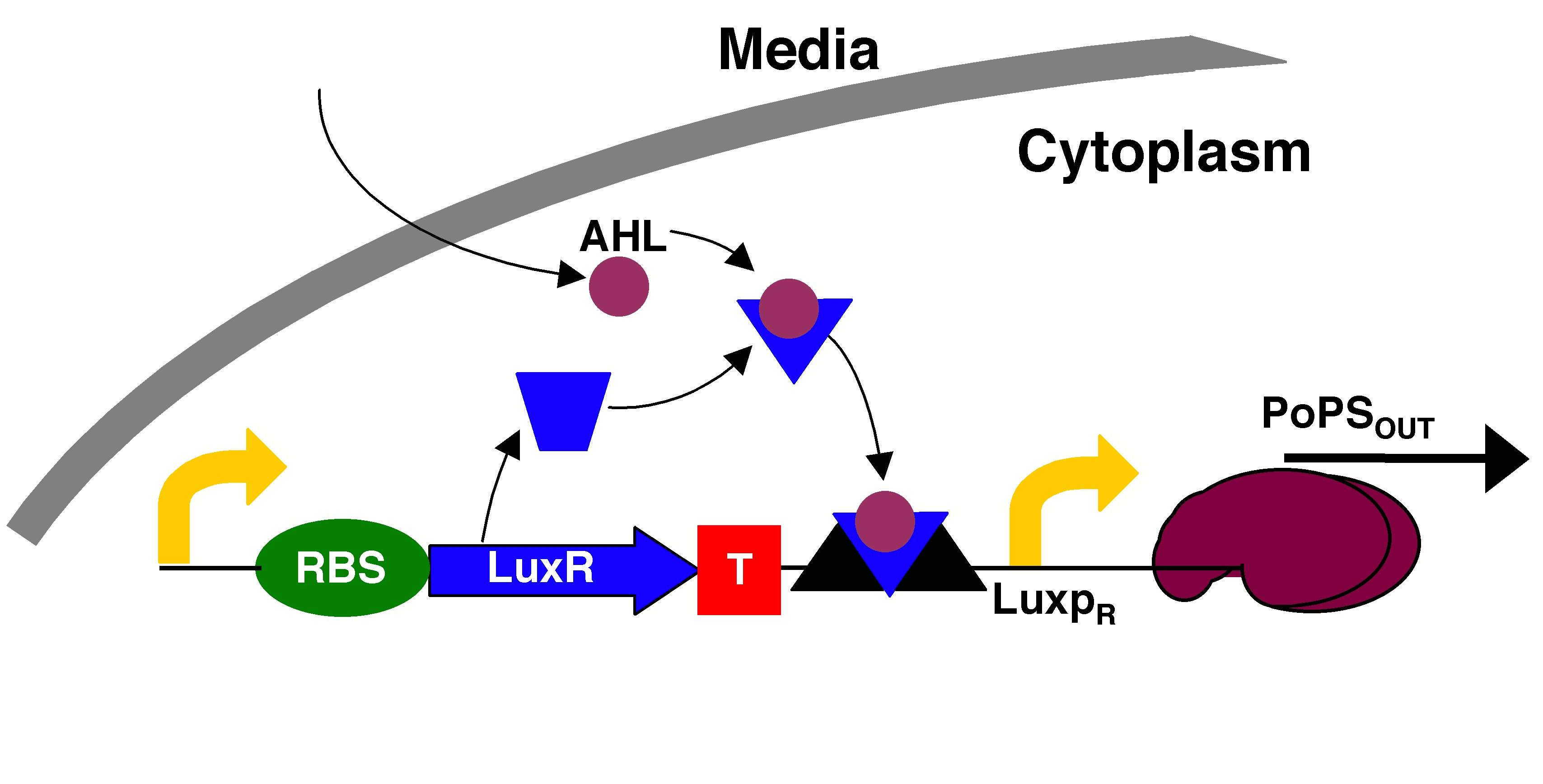Difference between revisions of "Lux"
Smelissali (Talk | contribs) (→Links and References) |
m (Life after the Lac operon was 404 @ MIT, corrected with working link) |
||
| (5 intermediate revisions by one other user not shown) | |||
| Line 1: | Line 1: | ||
==Lux operon== | ==Lux operon== | ||
[[Image:Luxrreceiverschematic.png|thumb|right|schematic for the action of the Lux operon]] | [[Image:Luxrreceiverschematic.png|thumb|right|schematic for the action of the Lux operon]] | ||
| − | *Basic Information: The lux operon encodes genes for self-regulation and for the production of luminescent proteins. | + | *Basic Information: The lux operon encodes genes for self-regulation and for the production of luminescent proteins. The most well studied operon is originally isolated from the bacterium [http://en.wikipedia.org/wiki/Vibrio_fischeri ''Vibrio fischeri''], whose operon-produced luciferase produces a yellowish colored bioluminescence of about 490 nm. |
*Component Genes | *Component Genes | ||
**pLuxR: "right hand" lux promoter region | **pLuxR: "right hand" lux promoter region | ||
| Line 7: | Line 7: | ||
**LuxI: | **LuxI: | ||
*Applications: These are based on the "quorum sensing" abilities of the Lux pathway to [[Help:Glossary:A#acyl-homoserine_lactones_(acyl-HSLs) | acyl-homoserine lactones]]. | *Applications: These are based on the "quorum sensing" abilities of the Lux pathway to [[Help:Glossary:A#acyl-homoserine_lactones_(acyl-HSLs) | acyl-homoserine lactones]]. | ||
| + | **See [[Featured Parts:Cell-Cell-Signaling]] for parts and documentation dealing with [https://parts.igem.org/cgi/partsdb/pgroup.cgi?pgroup=Signalling signalling] within the lux transduction | ||
==LuxR== | ==LuxR== | ||
| Line 16: | Line 17: | ||
==Links and References== | ==Links and References== | ||
For more information, visit: | For more information, visit: | ||
| − | *[http:// | + | *[http://www.sciencegateway.org/resources/biologytext/pge/pgeother.html "Life after the Lac Operon"] - An excellent overview of the operation of the best-studied operon systems including Lambda phage, Lux, and Trp. |
*[http://www.bio.cmu.edu/courses/03441/TermPapers/97TermPapers/lux/operon.html "Structure and Regulation of the Lux operon"] - Specific gene interactions within the lux operon | *[http://www.bio.cmu.edu/courses/03441/TermPapers/97TermPapers/lux/operon.html "Structure and Regulation of the Lux operon"] - Specific gene interactions within the lux operon | ||
| + | *[[Featured Parts:Cell-Cell-Signaling]] - BioBrick parts of the Lux operon dealing with signal receiving and sending | ||
Latest revision as of 15:24, 27 April 2009
Contents
Lux operon
- Basic Information: The lux operon encodes genes for self-regulation and for the production of luminescent proteins. The most well studied operon is originally isolated from the bacterium [http://en.wikipedia.org/wiki/Vibrio_fischeri Vibrio fischeri], whose operon-produced luciferase produces a yellowish colored bioluminescence of about 490 nm.
- Component Genes
- pLuxR: "right hand" lux promoter region
- LuxR:
- LuxI:
- Applications: These are based on the "quorum sensing" abilities of the Lux pathway to acyl-homoserine lactones.
- See Featured Parts:Cell-Cell-Signaling for parts and documentation dealing with signalling within the lux transduction
LuxR
LuxR is a constitutively expressed protein that can bind AHL. When bound to AHL it can stimulate transcription from the right hand lux promoter (pLuxR). In the natural system, this promoter controls transcription of the LuxI enzyme leading to a positive feedback loop that increases transcription from the right hand lux promoter. In addition controlling the transcription of luxI, the promoter also controls transcription of luciferase.
LuxI
LuxI is a synthase that converts SAM into a small molecule called an acyl-homoserine lactone (AHL). It can diffuse across cell membranes and is stable in growth media at a range of pH. In the natural system, the pLuxR promoter controls transcription of the LuxI enzyme leading to a positive feedback loop that increases transcription from the right hand lux promoter. In addition controlling the transcription of luxI, the promoter also controls transcription of luciferase.
Links and References
For more information, visit:
- [http://www.sciencegateway.org/resources/biologytext/pge/pgeother.html "Life after the Lac Operon"] - An excellent overview of the operation of the best-studied operon systems including Lambda phage, Lux, and Trp.
- [http://www.bio.cmu.edu/courses/03441/TermPapers/97TermPapers/lux/operon.html "Structure and Regulation of the Lux operon"] - Specific gene interactions within the lux operon
- Featured Parts:Cell-Cell-Signaling - BioBrick parts of the Lux operon dealing with signal receiving and sending

